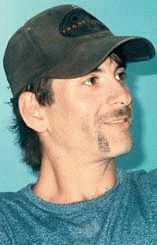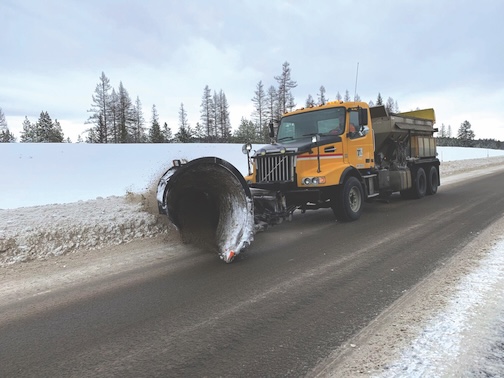FACE OF COURAGE
Published 12:00 am Tuesday, July 8, 2003

- Steve Sharp ().
COVE "Come out and meet my dogs."
Trending
Steve Sharp strode out of his unfinished house and through the backyard to the pen where his Brittany spaniels live. He reached up and unlocked the gate and stooped down to greet the three dogs who came tumbling out.
"They’re not used to coming out in the afternoon. I take them out every morning for a workout," he said as the dogs wiggled and climbed all over him.
Sharp’s dogs are part of his family, and he was saddened recently when his female spaniel was killed by a car on a rural road near Cove.
Trending
As tragic as that loss was, it probably could not match the tragedy that befell Sharp in 1992 when he was just 17 and ready to start his junior year of high school.
On the last day of his summer job on a farm in Eagle Valley near his Richland home, Sharp was baling hay.
"We had four wind rows left, about 45 minutes to go," Sharp said during a recent interview. "I was ready to go out for football. I decided to go ahead and finish the field, and I let my friend go home."
He was alone when the accident happened.
He stopped the tractor to clear some hay from the baler, and the tractor’s power take-off suddenly self-started, pulling Sharp’s arms into the baler. The machinery cut off both arms, but Sharp managed to free himself and walk for help.
"It got pretty ugly," he recalled. "I believe I passed out a couple of times."
Sharp was flown to Oregon Health & Science University Hospital in Portland, where he spent long hours undergoing several operations, followed by rehabilitation at the Shriners’ Hospital.
"I missed the first half year of school," Sharp said. "My grandmother had been a teacher and she was a smart lady. She tutored me so that I could graduate with my class. They wanted to hold me back, but I said, ‘No way.’ "
Steve traveled many times to Portland for therapy, and his left arm was eventually fitted with a prosthesis, an artificial arm with a hook that he controls with his back and shoulder muscles.
Another drastic change in Sharp’s life came a few months into his rehabilitation.
"People didn’t believe me when I said the tractor self-started," Sharp said about the accident.
After the accident a friend of Sharp’s family remembered that he had read a few years earlier about a similar accident involving a Case tractor like the 970 model driven by Sharp. The friend looked up the article and found the names of the lawyers who had represented the accident victim.
Sharp’s dad, R.E. Sharp, called the lawyers in Minnesota and told them about his son. At first, they were skeptical. The day before the elder Sharp’s call, the Case Corp. had settled with the estate of a man who was decapitated in an accident in which the power take-off apparently failed.
Sharp’s dad was insistent and persuaded the Minnesota lawyers to take the case.
The lawyers visited Sharp while he was at the Shriners’ hospital, where he told his story. Another man had been injured in the Midwest by a faulty power take-off in a Case tractor, and he had settled without going to trial.
At first, Sharp was reluctant to take legal action.
"Then we saw a video of a Case tractor self-starting," he said, and he decided to proceed.
The lawyers told Sharp that they would ask for $30 or $40 million in damages.
"I said, ‘How much? Holy smokes, guys!’ "
The lawsuit was filed in Racine, Wis., headquarters for Case.
During the three years that his lawyers were preparing to go to trial, with motions and counter-motions, Sharp remained in Oregon, taking physical therapy and going to school. He became an estimator for bridge construction and worked in Medford for a year and a half.
Finally, in February 1996, the trial began in Racine, a town deeply impacted by the presence of the Case corporation.
"They (Case) offered me $200,000 to settle," Sharp recalled. "I said ‘no way.’ "
Sharp recalled that a few prospective jurors refused to serve, saying that they could not rule against a company that had employed family members for generations.
"There’s even a J.I. Case High School there," Sharp said.
Sharp and his parents attended and testified during the trial.
"We were there about a month. It took the jury a couple of days to decide," Sharp said. "It was so stressful so much going on."
At the end, though, the Racine jury ruled primarily in Sharp’s favor, awarding him $6.3 million, according to several sources, including a copyrighted story in the Racine Journal Times and a State of Wisconsin Supreme Court document.
Sharp and his lawyer, Bill Manning of St. Paul, Minn., declined to discuss the amount of the award, but Manning said during a phone interview that the verdict did not surprise him.
"Not at all. We proved the defect, and the jury was courageous in a hometown," Manning said. "It’s not like we tried our case in a forum neutral to the corporation."
The jury awarded 35 percent of fault to Sharp, deciding that his actions were partly responsible for the accident.
"The verdict was reduced by the percentage of the fault to Steve," Manning said. "I don’t believe Steve was at fault one iota. Not at all."
Case appealed the verdict all the way to the Wisconsin Supreme Court, which ruled in Sharp’s favor on June 23, 1999.
After the trial, "they had a big party at the lawyer’s," Sharp said.
"I can live," he said about the award. "I can’t go play too much, but I don’t have to work too hard.
"The biggest thing is the accident should not have happened."
The story of Sharp’s accident and the trial is told in a book, "A Measure of Endurance," by the late William Mishler, which will be released by Alfred A. Knopf Publishing in September. Mishler died shortly after he completed the book.
Manning introduced Sharp to Mishler.
"I had known the author for years," Manning said. "He was an academic, (a member of) the University of Minnesota faculty. The story moved him. He wrote the first three chapters, sent them to 20 agents, and he had a contract."
Knopf is including "A Measure of Endurance" in its catalog for this summer, and Sharp said there is talk about movie rights.
"My Mom read the book she just loves it," he said. "She seems to be very happy about it."
As for Sharp who confesses a reading disability, "I haven’t read it I lived it."
The 28-year-old said he doesn’t know if he’ll be asked to travel and promote the book, but he already has been interviewed by ABC’s 20/20 for a program that probably will air this summer.
In the aftermath of Sharp’s successful lawsuit, he and Manning were invited to testify before the Senate Commerce Committee considering tort reform. Sharp has also testified before the Oregon Legislature.
Since the high-publicity trial, Sharp’s life has gone on. He has mastered the use of his artificial left arm, but the nerve damage to his right arm is too severe for him to tolerate another prosthesis.
"I hunt. I got a six-point buck," Sharp said.
His rifle has been modified to allow him to pull the trigger, using what he calls a clothespin-type device, with his mouth. He fishes with a specially modified pole, and he skis downhill.
"I can’t ski cross country because I can’t use ski poles," he said.
One recent winter, he skied into a tree, shattering his right stump, but even that didn’t keep him off the slopes. He expects to undergo additional surgery on that arm.
His financial gain has brought few changes to the lifestyle of the young man from Richland. He has invested in real estate, hiring Dave Driggers of ERA Driggers & Associates to manage his property.
"I couldn’t ask for anybody easier to work with," Driggers said about his client.
"He’s very optimistic, and he doesn’t let his accident hinder his ideas," Driggers said. "He loves life. It’s amazing how he gets along."
Among Sharp’s real estate investments is the 900-acre farm where he lives. The farm has about a mile of river frontage.
"I kind of bought the ranch for my dogs," he said.
Much of his farm is leased, but he has a plan.
"I want to put in ponds along the river, ponds for ducks and fishing," Sharp said. "I may get in touch with Ducks Unlimited. This is just a preliminary plan but it’s a thought."
He’s also remodeling his farm home.
About his future, "Mainly I want to live here, farm a little, have enough work so I’m not bored, but not too much work to keep me from fishing."









